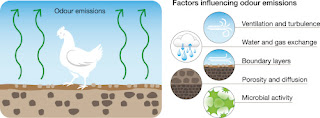How to remove bad odors/foul smell from poultry farms?
How to remove bad odors(foul smell) from poultry farms?
The stench of chicken droppings is the ever-present crisis
of poultry farmers.
In my eight years of work experience, I have also seen farms
operating without problems near the market and establishments. The farm, which
was closed a kilometer away due to the stench, has also been seen.
What is the difference between the two?
We all know that ammonia gas is the cause of the odor. Let's
see how ammonia gas is produced in poultry farms. Indigestible nitrogen elements
from the protein we feed the chickens in the form of uric acid are excreted as
white chicken droppings. This white uric acid is excreted instead of chicken
urine.
This uric acid is converted to urea by some bacteria in the
litter. Some other bacteria also convert uric acid directly into ammonia gas.
However, urea-producing bacteria are more prevalent. When the Urea is mixed
with water, the bacteria convert it into ammonia gas. Only when urea mixes with
water can bacteria convert urea into ammonia gas. This process is called
hydration of ammonia and volatilization. The ammonia gas produced in this way
is the odor that kills our sleep.
Not only is the odor caused by ammonia, but it also causes irritation
in the eyes and airways of the chicken and can lead to many diseases such as
CRD. The higher the moisture content in the coir pith/litter, the higher the
level of bacteria that produce such urea. and the rate of production of ammonia
as more uric acid mixes with water.In addition, if the pH of the Litter is above
7, it helps to increase the number of such bacteria. We know Harmful bacteria grow
only in the condition which ph above 7.
Read the previous article about beneficial and harmful
bacteria in the link below.
In short, should not allow increasing the moisture percentage of the
litter. Always keep at 25 percent moisture percentage. Two things can be
deduced from this: Farm odor can be avoided only by reducing the number of
bacteria that produce urea and by not associating uric acid and litter with
water. Another reason is that poor ventilation that prevents the ammonia gas formed in this way cannot
escape. On the sides of the broiler farm, the maximum height is only one foot. Everything
else should be mesh. The moisture
content of the coir should be between 20-25%, which should be checked
periodically by the farmer himself. Let's write another article about it.
* How to control ?
*
1. The roof should be extended at least 2.5 feet outwards
during the construction of the farm. This is to prevent rainwater and snow from
falling on the farm litter material. In addition, the curtains should be used
properly during the rainy season and winter to avoid water coming inside the
shed. The shed should be built in an east-west direction. Then Only the ammonia
gas will be properly expelled through the air.
2. The height of the water bowl should be set at the level
of the chicken tail. The water in the bowl should come to the level of the
tail, not the bottom. Those who use the nipple system should do the exact
opposite, setting the nipple that comes
above the chicken's head. Also, make sure that there is no leakage in the nipple
and other pipelines every day.
3. All the chances of diarrhea in chickens should be avoided,
water disinfection should be done properly, the water tank and water pipeline
should be washed properly and proper
biosecurity, etc. With diarrhea, uric acid, and moisture come into contact and
the odor of the farm increases significantly. Salmonella bacteria are a major
cause of diarrhea, and rats are the carriers of salmonella.
4. Racking the litter properly every day.
Chicken litter should be racked daily in a form that blends
well with the chicken manure.20 bags of 20kg of litter material per thousand
square feet must be spread out. The spread should be 1-1.5 inches high.
5. Spraying of beneficial probiotic bacteria on the coir
pith will reduce the amount of harmful bacteria in the litter that produces such
urea. Many products are available in the market.
6. Probiotics, acidifiers, and enzymes can be added to the
diet to regulate digestion and reduce excess protein and uric acid levels. Feeding
chicken with more protein will increase the uric acid level and increase the
odor when in contact with water.
If the litter moisture level controls efficiently in the poultry
farm, it will be easier for us to get rid of the odor, otherwise no matter how
hard we try, it will not leave the farm.
Dr.Abdu Rauoof P





Comments
Post a Comment